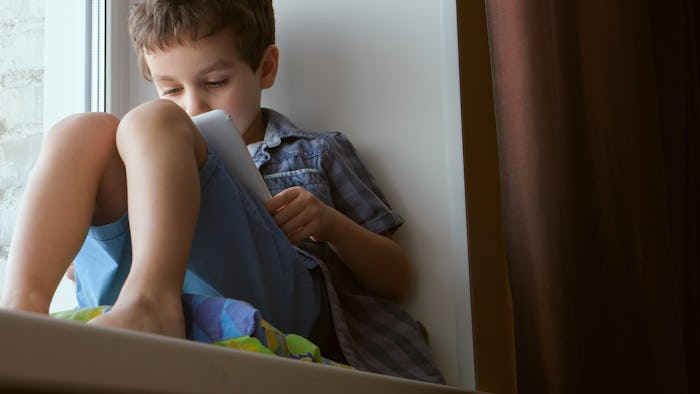Life

This Is How iPads Affect Your Child's Social Skills, According To An Expert
Like many households, every person in my home has their own iPad. I want to say I'm ashamed of that fact, but I'm really not. We are a digital family, and with that comes tablets, but does playing on an iPad affect my child's social skills? I will admit I'm noticing some disturbing consequences of my son's iPad addiction.
In 2015, the journal of the American Academy of Pediatrics (AAP), Pediatrics, published a bombshell article linking screen time to developmental delays, hyperactivity, speech disorders, and generalized social delays. This was followed up by the AAP changing their guidelines for parents in regards to their child's screen time. They suggested a multi-layered approach which hinges on solid parental involvement.
The AAP advised putting a family media plan in place that outlines expectations of use, amount of time allowed, and real, set, screen-free time. Megan Moreno, MD, MSEd, MPH, FAAP, and lead author of the policy statement on media use in school-aged children and teens said, "Parents can set expectations and boundaries to make sure their children's media experience is a positive one. The key is mindful use of media within a family." They know it's never going to be a perfect situation (nothing is), but the key is a proper management of resources and direction given to your children.
However, does playing on an iPad affect my child's social skills, if every other child is also using them?
An article in Psychology Today takes the AAP article and turns it into the mushroom cloud of mom shaming, saying "[t]he device does the thinking for them, and as a result, their own cognitive muscles remain weak." This is in spite of research that shows that there are apps that can help children's readiness to learn in school.
I spoke to French social anthropologist Marine Bertrand PhD about the research and what it means for our children. "No doubt we are seeing a decline in social cognitive functioning among post-millennials," she tells Romper via FaceTime. "Children are overall less likely to engage in imaginative play than they were even 10 years ago, and that is disturbing. Not only that, but when it comes to person-to-person interaction, we're seeing muted social cues in children who are heavy users of digital input, yet when the tablets or computers are taken away, we're seeing reactions very similar to those of people who are addicted to gambling or shopping."
The New York Times published an article in 2015 that outlined the stages of digital addiction in children, and like Bertrand says, it's a dire consequence. According to the article, children are losing their ability to self-soothe or entertain themselves without the internet or iPad games. They become rash and irrationally behaved in a very short period of time, leading researchers to believe that iPads are having more of a detrimental effect on our children than previously thought.
But is it all bad? Bertrand says no. "Our children are definitely growing up differently than we did, and in an age where everything we do relies on our ability to navigate the digital world, there are benefits to this sort of literacy. However, we have to understand that the world is a collaborative place, and that while the meaning of social interaction may very well be changing at a pace we think we're not ready for, there are some standards that have been in place since the beginning of time, and if your child isn't learning those because they're constantly sifting through input from a screen, then they will suffer for it."
The AAP agrees. In their guidelines, they wrote that being a part of the digital world is an essential part of today's society, and the ability to maneuver through everything internet-wise will be crucial in your child's life. However, they found that this cannot replace free time with other children. That is where they'll learn critical skills of interaction to assist them throughout their life.
The AAP also remarked that there's really no need for toddlers to be placed in front of digital media for hours on end, but they did find that there are applications and media that can assist in a child's learning from 18 months and up. Before 18 months of age, the AAP recommends the use of digital media and tablets only for FaceTime and phone calls, noting "Problems begin when media use displaces physical activity, hands-on exploration and face-to-face social interaction in the real world, which is critical to learning."
I know this is becoming the problem in my home. My 9-year-old son, who is on the autism spectrum, is very, very reliant on his iPad and Xbox. Often, he'll be running both at the same time. He also spends inconceivable amounts of time coding new programs and cruising YouTube to watch other kids play with the toys he owns, but is not playing with. I don't know what this research means to me or my family yet, but it's given me quite a bit to think about. Also, I think we'll head to the park for a much longer play later.